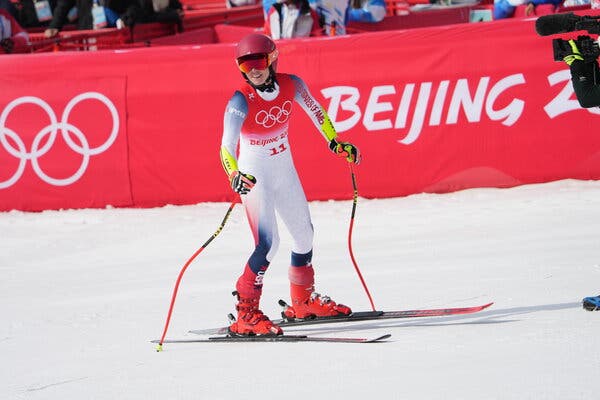
It has been a long time since a ninth place finish felt like a triumph for Mikaela Shiffrin, but there she was, at the finish area of the super-G Friday afternoon, speaking as though she had truly won something.
After failing to navigate more than 12 gates and not completing her opening runs in two of her best events this week. Shiffrin skied a clean and efficient run in the super-G, a speed race she has not entered in an Olympic Games, and made it across the finish line, finishing 0.79 seconds behind the gold medalist Lara Gut-Behrami of Switzerland.
Mirjam Puchner of Austria took the silver. Michelle Gisin of Switzerland won the bronze.
“I didn’t think there was a very good chance to win or even medal in this race,” she said. “I just skied strong, and it’s a really big relief to be here now in the finish having skied a run well.”
For Shiffrin, a two-time Olympic gold medalist, this has been by far the most trying major skiing competition of her career. She arrived at the Olympics expected to compete for as many as five medals and was a heavy favorite in the slalom races.
Three races in, she has crossed just a single finish line, though she still has a chance to make the ending of her Olympics far better than the beginning, with the downhill, the combined event and even the team competition still on her schedule next week.
The task of recovering from her stunning disappointments in the slalom and the giant slalom has moved Shiffrin into uncharted territory. She has had a mostly charmed career, though away from the mountain she had to grieve the sudden death of her father two years ago.
As she slept Thursday night, she said, she kept having a recurring dream in which she was skiing the race and kept crashing out on the fifth gate. It was not dissimilar to dreams she had after the 2018 Olympics, when she finished fourth in slalom and she dreamed of terrible things happening to her as she skied that run over and over.
“After the last week, there has been a lot of emotional fatigue,” she said. “I feel emotionally wary right now, definitely a sense of dullness, and you can’t have that racing, especially not racing speed.”
But the day broke bright, and Shiffrin felt renewed enough to ski the first section of the course hard and fast. Shiffrin led Gut-Behrami by a fraction of a second early. But midway through the course she took a safe, wide line around a pitched right turn, which cost her precious tenths of a second.
She also slipped slightly and momentarily lost her balance before recovering and cruising into the finish, where she broke into a wide grin showing off her bright white mouth guard. Her goal had been to ski the course properly and hard and she had done just that.
Within minutes she was embraced by her mother and coach, Eileen, and hugged by her boyfriend Aleksander Aamondt Kilde, who earned his second Olympic medal on Thursday with a silver in the men’s Alpine combined.
She said she has been inundated with messages of support this week, which has caught her off guard, one more element of duality to an experience that is entirely new for her. “It’s possible to feel both proud of a career and sad for the moment you are in,” she said.
Not on Friday, though. Friday did not feel sad. It felt like solid skiing, “on-point,” as Shiffrin put it, even if what happened in those first two races will always be there and maybe even keep coming back in those dreams.
“Failure is a scary word,” she said. “I have finally come to terms with that being a part of what we are doing here.”
Then she was off to train for the downhill.
Time | ||
|---|---|---|
Lara Gut-Behrami Switzerland | 1:13.51 | |
Mirjam Puchner Austria | 1:13.73 +0.22 | |
Michelle Gisin Switzerland | 1:13.81 +0.30 |







